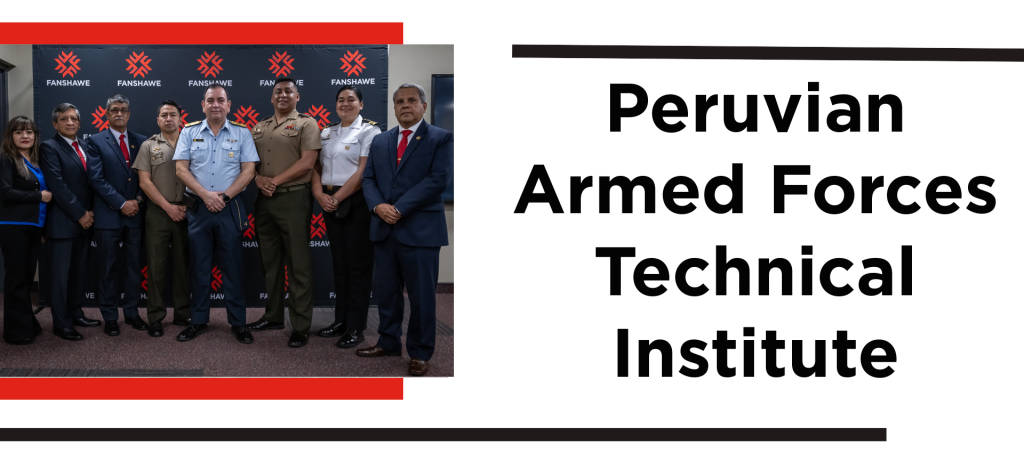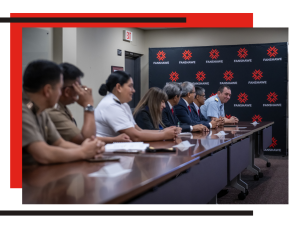
Insights and Aspirations from IESTPFFAA Leaders
Interviewed and written by Devika Santosh, a Public Relations and Corporate Communications graduate at Fanshawe College.
An eight-member delegation from the Peruvian Armed Forces Technical Institute (IESTPFFAA for its acronym in Spanish) came to London, ON in August 2024 to pursue a Leadership training customized program. The delegation led by General Director Ricardo Vera, gained a comprehensive understanding of Fanshawe College’s advanced educational environment as a result of their insightful visit to Fanshawe College. Among the things they were most impressed with were the college’s technological advancement, its human resources practices, and its effective communication channels between its students. This combination of elements, coupled with Fanshawe’s commitment to social responsibility, has left a lasting impression on the Peruvian delegation.
Upon arriving, the leaders had expectations centred on learning about Fanshawe’s educational system, leadership management, and its integrated approach to achieving student and community benefits. They encountered experiences that far exceeded their expectations. Observations were made regarding how Fanshawe’s organizational culture, which is characterized by integrity and trust, is reflected by the fact that external companies and the government support and trust Fanshawe’s budgetary decisions. In particular, the group was impressed with Fanshawe’s ability to maintain high standards in terms of key performance indicators, metrics, and budget management, while simultaneously demonstrating a high level of social responsibility, in particular through the empowerment of women and the introduction of micro-credentials that benefit students.
 The Peruvian leaders also highlighted Fanshawe’s innovative approach to infrastructure management, including its self-sustaining maintenance and business practices, including renting out student residences during the summer break. In addition to these practices, Fanshawe is also dedicated to assisting military students and providing extensive support to students with disabilities, demonstrating Fanshawe’s commitment to education and community service in a holistic manner.
The Peruvian leaders also highlighted Fanshawe’s innovative approach to infrastructure management, including its self-sustaining maintenance and business practices, including renting out student residences during the summer break. In addition to these practices, Fanshawe is also dedicated to assisting military students and providing extensive support to students with disabilities, demonstrating Fanshawe’s commitment to education and community service in a holistic manner.
There is a stark difference in educational infrastructure in Peru in comparison with Canada, as the Peruvian leaders acknowledged in reflecting on their context. In Peru, there is a minimal level of investment in education, particularly from mining and other industries. Their goal for Peru was to improve the quality of education, increase employment and graduation rates, increase salary prospects, and expand the impact of the community inspired by Fanshawe, which helped them identify four key indicators they intend to implement.
In particular, the delegation was particularly impressed by Fanshawe College’s alignment with Sustainable Development Goals (SDGs). Throughout the admissions and graduation process, the college’s comprehensive support systems, which promote quality education, demonstrated its commitment to SDGs, which promotes quality education. Furthermore, Fanshawe’s efforts to promote employment, reduce inequalities and improve sustainable infrastructure were viewed as examples of exemplary practices of SDGs that could serve as examples for similar initiatives in Peru.
Peru’s delegation returned with a vision to improve its educational system in small but significant ways. In addition to introducing workshops focusing on values and ethics, their institute will enhance resources and social services, and act as a community development incubator. Through the adoption of Fanshawe’s model, they hope to create a curriculum with a high level of proficiency and gradually advance the use of technology in education, ultimately benefitting their communities in the same manner that Fanshawe provided for them.


